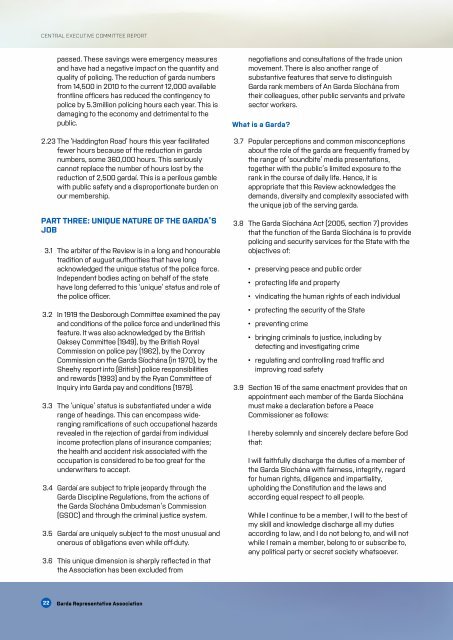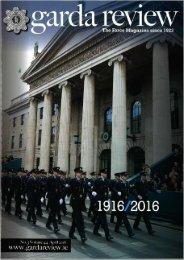Conference Report 2016
Table of contents contains links on page 5. It can be used to skip through chapters.
Table of contents contains links on page 5. It can be used to skip through chapters.
Create successful ePaper yourself
Turn your PDF publications into a flip-book with our unique Google optimized e-Paper software.
CENTRAL EXECUTIVE COMMITTEE REPORT<br />
passed. These savings were emergency measures<br />
and have had a negative impact on the quantity and<br />
quality of policing. The reduction of garda numbers<br />
from 14,500 in 2010 to the current 12,000 available<br />
frontline officers has reduced the contingency to<br />
police by 5.3million policing hours each year. This is<br />
damaging to the economy and detrimental to the<br />
public.<br />
2.23 The ‘Haddington Road’ hours this year facilitated<br />
fewer hours because of the reduction in garda<br />
numbers, some 360,000 hours. This seriously<br />
cannot replace the number of hours lost by the<br />
reduction of 2,500 gardaí. This is a perilous gamble<br />
with public safety and a disproportionate burden on<br />
our membership.<br />
PART ThREE: uNIQuE NATuRE Of ThE GARDA’S<br />
jOb<br />
3.1 The arbiter of the Review is in a long and honourable<br />
tradition of august authorities that have long<br />
acknowledged the unique status of the police force.<br />
Independent bodies acting on behalf of the state<br />
have long deferred to this ‘unique’ status and role of<br />
the police officer.<br />
3.2 In 1919 the Desborough Committee examined the pay<br />
and conditions of the police force and underlined this<br />
feature. It was also acknowledged by the British<br />
Oaksey Committee (1949), by the British Royal<br />
Commission on police pay (1962), by the Conroy<br />
Commission on the Garda Síochána (in 1970), by the<br />
Sheehy report into (British) police responsibilities<br />
and rewards (1993) and by the Ryan Committee of<br />
Inquiry into Garda pay and conditions (1979).<br />
3.3 The ‘unique’ status is substantiated under a wide<br />
range of headings. This can encompass wideranging<br />
ramifications of such occupational hazards<br />
revealed in the rejection of gardaí from individual<br />
income protection plans of insurance companies;<br />
the health and accident risk associated with the<br />
occupation is considered to be too great for the<br />
underwriters to accept.<br />
3.4 Gardaí are subject to triple jeopardy through the<br />
Garda Discipline Regulations, from the actions of<br />
the Garda Síochána Ombudsman’s Commission<br />
(GSOC) and through the criminal justice system.<br />
3.5 Gardaí are uniquely subject to the most unusual and<br />
onerous of obligations even while off-duty.<br />
3.6 This unique dimension is sharply reflected in that<br />
the Association has been excluded from<br />
negotiations and consultations of the trade union<br />
movement. There is also another range of<br />
substantive features that serve to distinguish<br />
Garda rank members of An Garda Síochána from<br />
their colleagues, other public servants and private<br />
sector workers.<br />
what is a Garda?<br />
3.7 Popular perceptions and common misconceptions<br />
about the role of the garda are frequently framed by<br />
the range of ‘soundbite’ media presentations,<br />
together with the public’s limited exposure to the<br />
rank in the course of daily life. Hence, it is<br />
appropriate that this Review acknowledges the<br />
demands, diversity and complexity associated with<br />
the unique job of the serving garda.<br />
3.8 The Garda Síochána Act (2005, section 7) provides<br />
that the function of the Garda Síochána is to provide<br />
policing and security services for the State with the<br />
objectives of:<br />
• preserving peace and public order<br />
• protecting life and property<br />
• vindicating the human rights of each individual<br />
• protecting the security of the State<br />
• preventing crime<br />
• bringing criminals to justice, including by<br />
detecting and investigating crime<br />
• regulating and controlling road traffic and<br />
improving road safety<br />
3.9 Section 16 of the same enactment provides that on<br />
appointment each member of the Garda Síochána<br />
must make a declaration before a Peace<br />
Commissioner as follows:<br />
I hereby solemnly and sincerely declare before God<br />
that:<br />
I will faithfully discharge the duties of a member of<br />
the Garda Síochána with fairness, integrity, regard<br />
for human rights, diligence and impartiality,<br />
upholding the Constitution and the laws and<br />
according equal respect to all people.<br />
While I continue to be a member, I will to the best of<br />
my skill and knowledge discharge all my duties<br />
according to law, and I do not belong to, and will not<br />
while I remain a member, belong to or subscribe to,<br />
any political party or secret society whatsoever.<br />
22 Garda Representative Association




